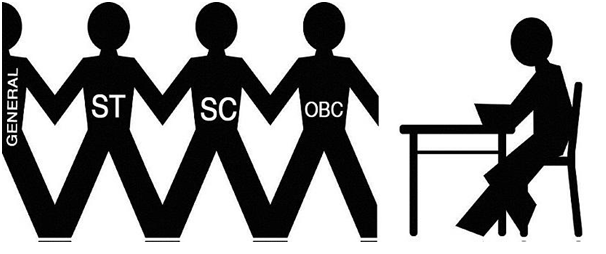Does Reservation Policy need an Overhauling
Policy of Reservation
- Reservation is a system of affirmative action in India that provides historically disadvantaged groups representation in education, employment, government schemes, health, insurance, banking, foreign higher education, scholarships and politics.
- Based on provisions in the Indian Constitution, it allows the Union Government and the States and Territories of India to set reserved quotas or seats, which lower the qualifications needed in exams, job openings, university admissions, scholarships, loan approval, promotions etc. for “socially and educationally backward citizens.
Constitutional Provisions related to Reservation
- Part XVI of the Constitution deals with the reservation of SC and ST in Central and State legislatures.
- Articles 15(3)(4)(5)(6) and 16(4) allowed state and central governments to set reservation seats in government services for members of the SC and ST communities.
- Articles 330 and 332 provide for particular representation in the Parliament and State Legislative Assemblies, respectively, by reserving seats for SCs and STs.
- Every Panchayat is required by Article 243D to reserve seats for SCs and STs.
- Every municipality is required by Article 233T to reserve seats for SCs and STs.
- According to Article 335 of the constitution, the claims of STs and STs must be taken into account in conjunction with the administration’s efficacy.
Arguments against Reservation
- The Constitution provided provision for reservation only for 10 years that, too, explicitly only in the legislature and a “proviso” Article 16(4) which allowed the state to provide reservation in Government employment.
- The Attorney General claimed in the Court that political parties use reservation for vote bank politics. For e.g. “Sons of the soil” reservation in states of Haryana and Madhya Pradesh
- It is said that reservation has kept the Caste alive in Indian society.
- Indian middle-class society detests the term “reservation”, and raises the bogeys of merit and efficiency or of casteism and vote-bank politics.
- Privileged groups have come into existence which corner all the benefits of reservation.
Why do we need reservation then?
- Equal representation: Increase in the number of people from backward sections in various decision-making procedures, resulting in equal representation from different sections of the society.
- Equal opportunities to the deserving candidates: It have helped some people from backward sections achieve higher posts or services in the public sector and some private institutions as well.
- Implementation of justice and human rights: It has encouraged the people to fight for justice whenever there is a violation of their human rights.
- Economic balance in the society: Reservation has slowed down the process of forward becoming richer and backward becoming poorer.
- Historical injustice: Caste-based reservation is necessary for India because of historical negligence, injustice, and mistreatment caused to the backward communities.
- Levelled playing field: Reservation provides a level playing field as it is difficult for those from the backward sections who were historically disadvantaged of education, skills, and financial or economic mobility to all of a sudden start competing with those who had access to those resources for hundreds of years.
- Meritocracy Vs. Equality: Meritocracy is essential; however, it will have no meaning without equality. People must be brought up to the same level whether it elevates a section or decelerates another regardless of merit. Thus, the caste-based reservation also minimises the gap between upper and lower castes to a great extent.
Reservation as a policy of inclusion has provided mixed results. The need is to streamline it according to changing times. Apart from caste and gender (women and third gender), the specially abled should be given priority. To exclude the privileged, a creamy layer option could be introduced in scheduled caste and tribe reservations.
We need to understand that caste is a social ill and there is a strong need for caste sensitization and to make people aware of the constitutional value of equality. Communities need to shed their old dogmas and accept their co-citizens as equals and similar.
| Practice Question
1. Do you think the Policy of reservation needs transformation with changing society? |





